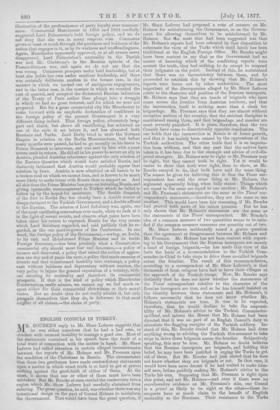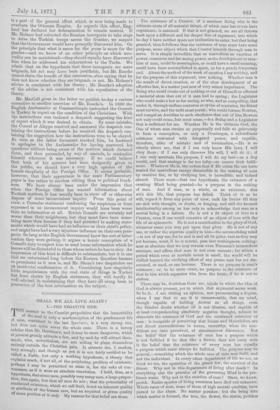ENGLISH CONSULS IN TURKEY.
MR. BOURKE'S reply to Mr. Shaw Lefevre suggests that he was either conscious that he had a bad case, or stricken with unusual inability to manage a good one. Most of the statements contained in his speech have the fault of a total want of connection with the matter in hand. Mr. Shaw Lefevre had called attention to certain alleged inconsistencies between the reports of Mr. Holmes and Mr. Freeman upon the condition of the Christians in Bosnia. The circumstance that these two gentlemen have made contradictory statements upon a matter in which exact truth is so hard to get at proves nothing against the good-faith of either of them. At the most, it shows that one or other of them must have been mistaken. But Mr. Bourke at once carried the controversy into a region which Mx. Shaw Lefevre had carefully abstained from entering. The great question, he said, was whether there was any intentional design on the part of Consul Holmes to misinform the Government. That would have been the great question, if Mr. Shaw Lefevre had proposed a vote of censure on Mr. Holmes for misinforming the Government, or on the Govern- ment for allowing themselves to be misinformed by Mr. Holmes. But the most that had been suggested was that Mr. Holmes's reports had been coloured by that disposition to extenuate the vices of the Turks which until lately has been traditional at the English Foreign Office. Mr. Bourke might have been content to say that as the Government had no means of knowing which of the conflicting reports were nearest the truth, they had nothing to do except to suspend their judgment on the point. Instead of this, he maintained that there was no inconsistency between them, and he proceeded to establish this by showing that Mr. Holmes's reports were borne out by other authorities. The most important of the discrepancies alleged by Mr. Shaw Lefevre relate to the character and position of the Bosnian insurgents. Mr. Holmes says that they are bands of brigands who have come across the frontier from Austrian territory, and that the insurrection itself is nothing more than a cloak for brigandage. Mr. Freeman says that they are almost without exception natives of the' country, that the strictest discipline is maintained among them, and that brigandage and murder are most severely punished. It is plain, therefore, that the two Consuls have come to diametrically opposite conclusions. The one holds that the insurrection in Bosnia is of home growth, and that it has mainly been caused by the oppressions of the Turkish authorities. The other holds that it is an importa- tion from without, and that any part that the natives have taken in it has been due to the example and advice of evil-dis- posed strangers, Mr. Holmes may be right or Mr. Freeman may be right, but they cannot both be right. Yet it would be easier to Show that both were right, than to show, as Mr. Bourke essayed to do, that both have said the same thing. The reason he gives for believing this is that the Times cor- respondent has said the same thing as Mr. Holmes, the argument apparently being, when fully stated : Things which are equal to the same are equal to one another ; Mr. Holmes's and Mr. Freeman's statements are the same as the Times' cor- respondent's statement,—therefore, they are the same as one another. This would have been fair reasoning, if Mr. Bourke had proved both parts of his minor premiss. But he has only shown that Mr. Holmes's statements are the same as the statements of the Times' correspondent. Mr. Bourke's idea of a common measure of two quantities seems to be satis- fied if the common measure measures one quantity out of two.
Mr. Shaw Lefevre incidentally raised a graver question than the agreement or disagreement between Mr. Holmes and Mr. Freeman. Mr. Holmes has not been content with report- ing to his Government that the Bosnian insurgents are merely a band of foreign brigands,—he has made this view of the facts the basis of a recommendation to the Turkish Com- mander-in-Chief to take steps to drive these so-called brigands across the frontier. The result of this recommendation, according to a correspondent of Mr. Shaw Lefevre's, is that thousands of fresh refugees have had to leave their villages at the approach of the Turkish troops. Now, Mr. Bourke says distinctly that he does not know whether the statements of the Times' correspondent relative to the character of the Bosnian insurgents are true, and as he has himself insisted on the identity between these statements and Mr. Holmes's, it follows necessarily that he does not know whether Mr. Holmes's statements are true. It was to be expected, therefore, that he would decline to take the responsi- bility of Mr. Holmes's advice to the Turkish Commander- in-Chief, and inform the House that Mr. Holmes had been directed that it was no part of an English Consul's duty to stimulate the flagging energies of the Turkish soldiery. In- stead of this, Mr. Bourke denied that Mr. Holmes had done anything wrong in advising the Turkish Government to take steps to drive these brigands across the frontier. Subjectively speaking, this may be true, Mr. Holmes no doubt believes that the Bosnian insurgents are brigands, and holding this belief, he may have been justified in urging the Turks to get rid of them. But Mr. Bourke had just, stated that he does not know whether they are brigands or not. In that case, it would have been more decent if he had waited to make him- self sure, before publicly making Mr. Holmes's advice to the Turks his own, Supposing that Mr. Freeman is right upon this point, and not Mr. Holmes—and oven if there were no corroborative evidence on Mr. Freeman's side, one Consul is a priori as likely to he right as the other—these in- surgents have as much claim to the benefit of English neutrality as the Russians. Their resistance to the Turks is a part of the general effort which is now being made to overturn the Ottoman Empire. As regards this effort, Eng- land has declared her determination to remain neutral. If Mr. Holmes had exhorted the Bosnian insurgents to take steps to drive the Turkish troops across the frontier, we suspect that the Government would have promptly disavowed him. On the principle that what is sauce for the goose is sauce for the gander—and we know of no other principle on which neu- trality can be maintained—they should equally have disavowed him when he addressed his exhortations to the Turks. We admit that on the hypothesis that these insurgents are mere brigands, his act may have been justifiable, but Mr. Bourke cannot claim the benefit of this concession, after saying that he does not know whether they are brigands or not. Mr. Holmes's advice is consistent with his theory ; Mr. Bourke's adoption of the advice is not consistent with his repudiation of the theory.
Mr. MacColl gives in the letter we publish to-day a curious corrective to another assertion of Mr. Bourke's. In 1860 the English Ambassador at Constantinople instructed the Consuls in Turkey to report on the condition of the Christians. With the instructions was inclosed a despatch suggesting the kind of report which it was desired to obtain. By some mistake, the Consul at Aleppo received and answered the despatch con- taining the instructions before he received the despatch con- taining the suggestion how the instructions were to be obeyed. As soon as the latter document reached him, he hastened to apologise to the Ambassador for having answered his questions without being aware of the motives which dictated them, and then proceeded, by way of amends, to contradict himself wherever it was necessary. If we could believe that both of his answers had been designedly given to the public, we should have a very high opinion of the honest simplicity of the Foreign Office. It seems probable, however, that their appearance in the same Parliamentary paper is due rather to careless editing than to political frank- ness. We have always been under the impression that when the Foreign Office has wanted information about Turkish matters, it has usually been to stave off or otherwise dispose of some inconvenient inquiry. From this point of view, a Consular statement confirming the suspicions or fears expressed in an inconvenient inquiry would have been worse than no information at all. British Consuls are certainly not worse than their neighbours, but they must have been some- thing more than human if they had persisted in making state- ments which would have had no influence on their chief's policy, and might have had a very injurious influence on their own pros- pects. So long as the English Government knew the sort of infor- mation they were getting, it argues a heroic conception of a Consul's duty to expect him to send home information which he !mows will be distasteful to those whose orders he has to obey. An impression of this kind is difficult to substantiate., but it is one that we entertained long before the Eastern Question became as prominent as it now is, and Mr. Skene's two despatches are an incidental confirmation of it. Considering how singularly little acquaintance with the real state of things in Turkey has been shown by English statesmen, they will hardly be well advised in maintaining that they have all along been in Possession of the best information on the subject.



































 Previous page
Previous page